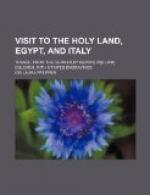that I could mount once more. Mr. B. had determined
to perform the distance from Joppa to Jerusalem (a
sixteen hours’ ride) at one stretch. He
indeed asked me if I could bear so much fatigue; but
I was unwilling to abuse his kindness, and therefore
assured him that I could manage to ride on for five
or six hours longer. Fortunately for my reputation,
my companion was soon afterwards attacked with the
same symptoms that troubled me so much; he now began
to think that it might, after all, be advisable to
rest for a few hours in the next village, especially
as we could not hope in any case to reach the gates
of Jerusalem before sundown. I felt silently
thankful for this opportune occurrence, and left the
question of going on or stopping altogether to the
decision of my fellow-traveller, particularly as
I knew the course he would choose. Thus I accomplished
my object without being obliged to confess my weakness.
In pursuance of this resolve, we stayed in the neighbouring
village of “Kariet el Areb,” the ancient
Emmaus, where the risen Saviour met the disciples,
and where we find a ruin of a Christian church in
a tolerable state of preservation. The building
is now used as a stable. Some years ago this
was the haunt of a famous robber, who was scheikh
of the place, and let no Frank pass before he had
paid whatever tribute he chose to demand. Since
the accession of Mehemet Ali these exactions have
ceased both here and in Jerusalem, where money was
demanded of the stranger for admission into the Church
of the Holy Sepulchre and other sacred places.
Even highway robberies, which were once on a time
of daily occurrence among these mountains, are now
rarely heard of.
We took possession of the entrance-hall of a mosque,
near which a delicious spring sparkled forth from
a grotto. Seldom has any thing strengthened
and refreshed me so much as the water of this spring.
I recovered completely from my indisposition, and was
able to enjoy the beautiful evening.
As soon as the scheikh of the village heard that a
party of Franks had arrived, he despatched four or
five dishes of provisions to us. Of all these
preparations we could only eat one—the butter-milk.
The other dishes, a mixture of honey, cucumbers, hard-boiled
eggs, onions, oil, olives, etc., we generously
bestowed upon the dragoman and the muker, who caused
them quickly to disappear. An hour afterwards
the scheikh came in person to pay his respects.
We reclined on the steps of the hall; and while the
men smoked and drank coffee, a conversation of a very
uninteresting kind was kept up, the dragoman acting
as interpreter. At length the scheikh seemed
seized with the idea that we might possibly be tired
with our journey. He took his leave, and offered
unasked to send us two men as sentries, which he did.
Thus we could go to rest in perfect safety under
the open sky in the midst of a Turkish village.




